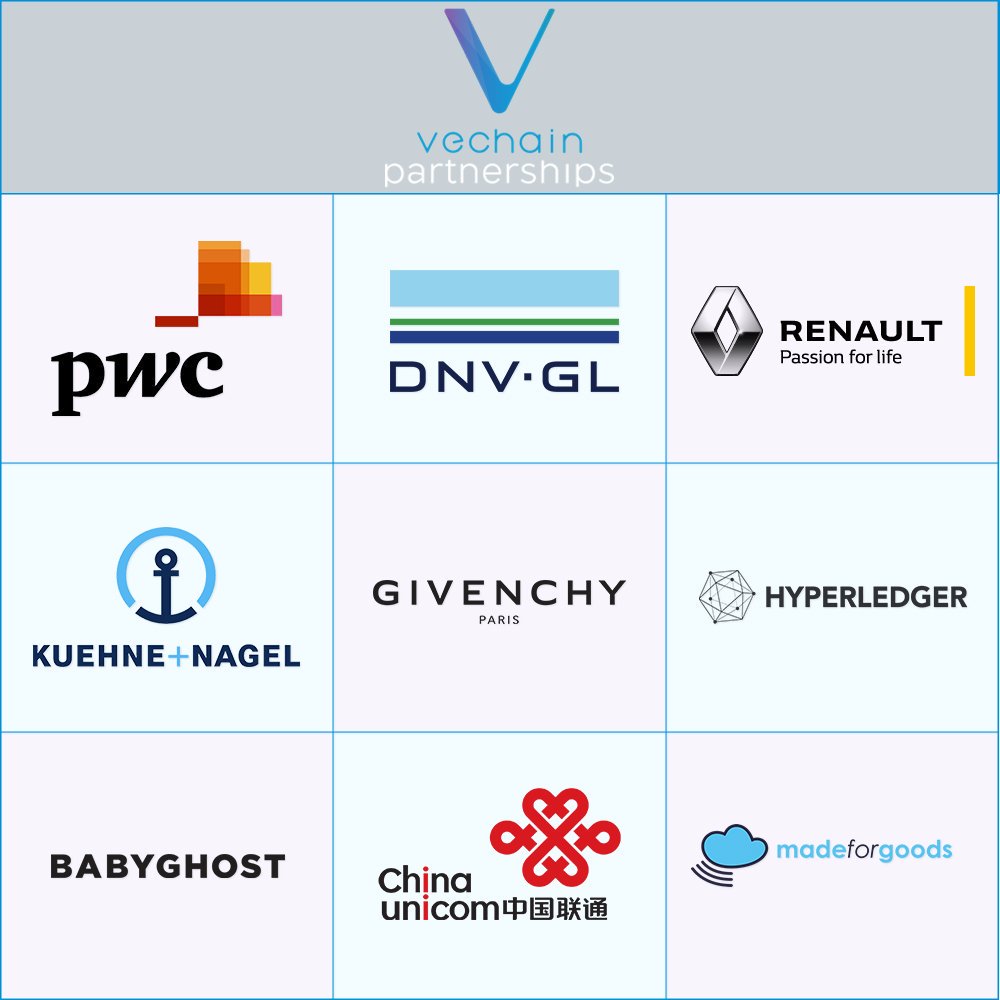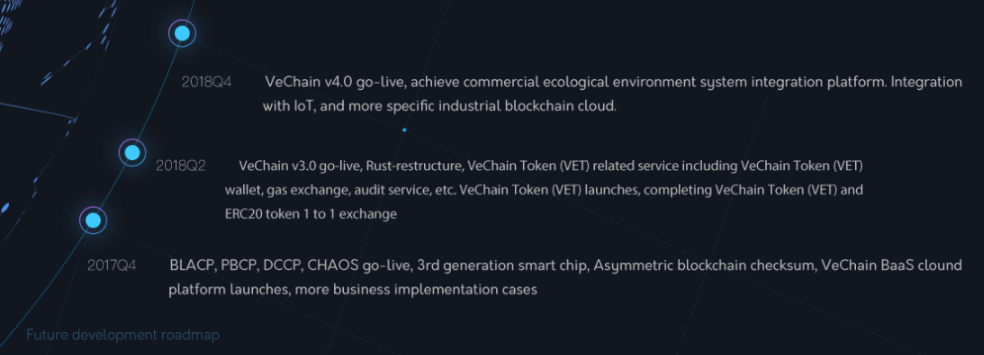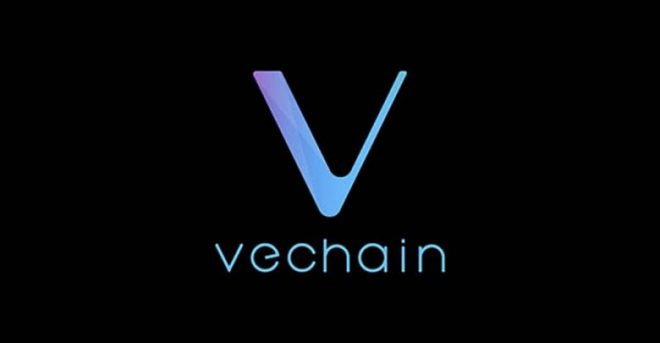VeChain was founded in 2015, making it one of the oldest blockchain companies in the industry. Based in Singapore, they recently fell into the good graces of investors with a continuous stream of promising partnerships. However, even before VeChain gained momentum, their blockchain solution was already being used by several companies in the agricultural, wine, and luxury goods industries.
VeChain shows absolutely no signs of slowing down development, with an upcoming rebranding from VeChain (VEN) to VeChain Thor VET. This upgrade will make it possible to build decentralized apps on the VeChain blockchain, which is similar to Ethereum. With all this upcoming news, it’s important to know what exactly you’re getting excited about.
The VeChain Platform
VeChain is one of the leading blockchain companies focusing on products and information. The company is building a decentralized platform for business solutions, on which businesses can easily interact and transact with each other without any intermediary. The VeChain company has set out to create a seamlessly operating platform for business solutions that can handle 10,000 transactions per second.
This impressive number of transactions alone would put VeChain ahead of competition, but their ambitions for future developments are what truly sets them apart. Their focus is disrupting supply chain management by integrating it onto their blockchain platform, but this is merely the beginning. Plans for allowing dApps and ICOs on the VeChain platform, as well as IoT (Internet of Things) integration, indicate VeChain’s aspirations to become an all-inclusive blockchain platform for enterprise solutions.
Supply Chain Solutions
VeChain’s primary focus is putting supply chains on the blockchain. Blockchain technology is the perfect match for supply chains, as it allows for more efficiency and transparency.
Blockchain technology prevents tampering with any data on its chain, meaning that all the data of a supply chain entered onto the blockchain is immutable. The system is also trustless, meaning parties don’t have to trust each other to transact, they can just trust the blockchain.
VeChain will use their blockchain for secure and immutable data storage for entire supply chains. Each separate organization in the supply chain will have access to the information through their private keys. This means that each node in the supply chain will access the same data and use the same accounting procedures. Once a supply chain is on the VeChain platform, it can seamlessly transact with all the organizations within the chain, and cost inefficiencies can be easily signaled and solved.
Besides the obvious benefits for retailers, usage of the VeChain platform also creates benefits for consumers. Consumers will be able to fully observe the supply chain a product has gone through before they buy it. Authenticity, the source of origin, and where organizations have added value to the product are transparent and free to access, and consumers can base their purchases on this. Consumers can check whether their 1907 Bordeaux wine is authentic and from which vineyard the grapes originate, whether their coffee actually comes from Venezuela, and whether any dubious companies were involved in the production of their shoes.
This is possible because each product on the VeChain platform will be given a unique identity. In most cases, this will be a RFID tag, which will be given to the first company in the supply chain. An RFID tag is a miniscule chip that is not much different from barcodes, only these chips communicate with their designated networked system. These chips, or tags, are added to the product’s packaging, and every node in the supply chain will be required to add essential information to a product’s identity. Once the data is entered, it can’t be changed. Each organization will also have a unique, immutable identity, meaning other companies can’t duplicate it. So by the time the product is stocked in stores, each action and organization involved in its production will be traceable.
VeChain produces their RFID chips in-house and are currently working on several upgrades for the technology, such as an integrated thermometer. This device will constantly monitor the surrounding temperature of, for example, food when it’s being transported, making sure the transporting company doesn’t let the food spoil. This is just one of the many envisioned products and services of VeChain. Besides the food industry, VeChain focuses on and already has business customers in the pharmaceutical, liquor, automotive, luxury goods, retail, logistics, and cold storage industries.
Partnerships

VeChain has been steadily expanding its network and has one of, if not the, most impressive lists of partnerships. One of its biggest partners is PricewaterhouseCooper (PWC), a renomated multinational professional services platform. VeChain and PWC want to offer third-party services to participants on VeChain’s decentralized platforms.
Another big partnership is the one with global assurance company DNV GL. VeChain also has partnerships with the Shanghai-based company DIG, who are responsible for checking 30% of all wine imports in China, Jiangsu Printed Electronics, and French car manufacturer Renault… and the list does not end there. Together with PWC, VeChain is rapidly expanding its network, strengthening the value of its platform with each new member.
Then there is another partnership that deserves special attention: VeChain’s national-level partnership with China. China has been building, and intends to continue building, completely new cities. Gui’an is one of these designated areas for economic development, and it covers around 1,800 square kilometers. China has been doing this to create cities that are tech-ready from day one. The entire infrastructure of the city is based on the implementation of recent and future technologies so that these can be directly and efficiently implemented. These technologies entail, but are not limited to, smart manufacturing, cloud computing, the Internet of Things, and, of course, blockchain technology
China Telcom, China Unicom, Microsoft, and Apple have already heavily invested in the development of the Gui’an area, and guess what. VeChain has been approached to become the blockchain-based backbone of the area. VeChain will become the technology partner of the regional government and will test several of their blockchain applications. Initially, this cooperation will serve as a pilot through which the Chinese government can closely examine the practical and regulatory implications of blockchain technology. The foundation of an e-governance system will be tested here, and when successful, the cooperation between the Chinese government and VeChain will likely lead to many more implementations of VeChain’s blockchain applications, giving the VeChain platform a major competitive advantage.
The VeChain Team
VeChain was created and is being constantly improved by the VeChain Foundation, a non-profit entity based in Singapore. The CEO of the VeChain Foundation, Sunny Lu, has already been making quite a name for himself in the blockchain space. Before the launch of VeChain, he co-founded a Chinese internet start-up, which created Qtum, one of the bigger players in the crypto space. Prior to this, he was the CIO and COO of Louis Vuitton China.
Sunny Lu leads a team made up by over 90+ employees, mainly developers, but he doesn’t do this alone. Besides him there is his Chief Technology Officer, Gu Jianliang. He has over 18 years of accumulated experience in related technology fields, such as mobile devices and the IoT, and holds over a 100 patents in various technological fields. Additionally, Kevin Feng functions as the Chief Operations Officer of the VeChain Foundation. Feng has taken on many technology projects during his 12 years working for VeChain’s partner, PWC, as a consultant and assurance advisor. Finally, the CFO is Jie Zhang, an expert in the field of IT with a large variety of experience in various fields of technology.
Competitors and Challenges
VeChain isn’t the only company trying to integrate blockchain technology into supply chain. Competitors, for example, are the Request Network and Stratis. VeChain seems to be in the lead compared to its competitors with its large network of partnerships. However, there is plenty of room for multiple blockchain platforms in this space, as supply chains exist in nearly every global industry. As recent events have attested, China hasn’t been particularly friendly towards cryptocurrencies, and this has created large obstacles for blockchain companies trying to penetrate the Chinese market. However, with VeChain enjoying a national-level partnership with China, it’s safe to say that they have been given an incredible advantage in the world’s second biggest economy.
Additionally, VeChain isn’t limiting their scope to China, and they have offices in Singapore, France, and Hong Kong, plus a large number of international partnerships. The main challenges for VeChain at the moment are proving their concept and that their blockchain platform is actually disruptive, staying in the good graces of the Chinese government, and meeting their technological deadlines.
VeChain’s Roadmap

VeChain has a lot of milestones coming up in 2018, the first of which is the launch of an upgrade of their platform, v3.0. This goes hand in hand with one of VeChain’s most noticeable upcoming developments. Namely, VeChain is rebranding from VeChain (VEN) to VeChain Thor (VET). VeChain Thor is a technological upgrade to the current platform. With this upgrade, the platform will allow for easier creation of decentralized business applications on top of the VeChain blockchain.
Once this technological upgrade has been finalized, the VeChain platform will accept two tokens, VET (currently VEN) and the Thor Power Token. The VET will still be the main token for business transactions on the platform, but users of the platform will receive Thor Power as a reward for holding VET. The Thor Power token will be used to run smart contracts and applications on the VeChain platform, similar to how GAS is used on the NEO blockchain. According to VeChain’s roadmap, the rebrand will occur on the February 26, 2018.
The next upgrade, v4.0, is scheduled for the end of 2018. One key feature of this upgrade is the integration of VeChain with the Internet of Things (IoT), which has a lot of tech enthusiasts quite excited. Besides the IoT, upgrade v4.0 will also lead to commercial, ecological, and environmental features on the VeChain platform.
How To Purchase and Store VEN
You can buy VeChain (VEN) on the following exchanges:
- Binance
- Huobi.pro
- Liqui
- Kucoin
- HitBTC
- QRYPTOS
- Lbank
- BigOne
- COSS
- VNBIG
- CryptoFalcon
Currently, there is no wallet dedicated to the VeChain token . It has been announced that a wallet will be made publicly available in Q2 of 2018. Until then, you can store your VEN in ERC-20 wallets like MyEtherWallet, Ledger Wallet, Mist, and Metamask.
Concluding Remarks
In contrast with most current blockchain projects, VeChain already has a proven working platform. This platform has been used for a while by multiple businesses, and with the high-profile partners that they have, usage of the VeChain platform is bound to increase, resulting in more and more demand. VeChain has praised DNV Gl and PWC for attracting new clientele on a regular basis, and we can see that their hard work is paying off.
Regarding their partnership with the Chinese government, VeChain seems to have done the impossible by gaining approval by the mostly anti-crypto authorities of the second largest economy on the globe. This is a major competitive advantage and could lead to incredible growth, while competitors struggle to even set foot in the Chinese economy. Almost everything reported about VeChain signals the company has a strong desire for rapid expansion and the tools to make it happen. VeChain is definitely a blockchain company to follow over the course of 2018.

